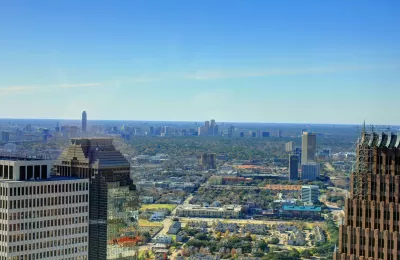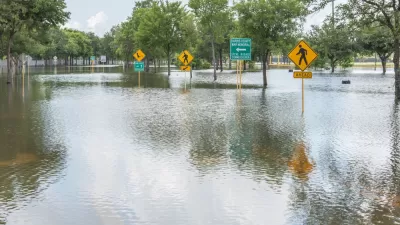Houston's director of Transportation and Drainage Operations wants to see more sustainable development in the city that has historically depended on freeways as its critical infrastructure.

Earlier this year, Houston experienced "one of the worst natural disasters in Texas history as a severe winter storm crippled infrastructure across the state." Veronica O. Davis, the city's new Director of Transportation and Drainage Operations, writes that the city "finds itself at a critical point."
Houston ranks as "one of the nation’s most unsafe for pedestrians and there is a wide gap between neighborhoods’ access to resources," says Davis. "For decades, federal transportation policy has added to these challenges by disproportionately encouraging and subsidizing the growth of one type of transportation infrastructure: highways, which receive 80 percent of federal transportation funding in the U.S." But there is another way. "By offering many ways to get around, we can help reconnect divided neighborhoods, provide more access to opportunity for all Houstonians, lessen racial inequities, and, with less concrete, have our neighborhoods flood less often." Davis says the city is making progress. "With the Resilient Houston plan, we are investing in drainage and green infrastructure to manage stormwater from major and minor storms. And under Mayor Sylvester Turner’s Complete Communities initiative, we are investing in Houston’s under-resourced neighborhoods — right-sizing roads to make them safer for people walking and biking, and working to reduce flooding."
But according to Davis, the city needs help from the federal government. Pointing to a proposal included in the House reconciliation package which includes $10 billion in funding for buses in underserved neighborhoods and "$4 billion to repair the historic damage to Black and low-income neighborhoods caused by highways that intentionally destroyed thriving places and widened segregation," Davis says "these targeted measures could be transformative, tying funding directly to goals, and giving local governments a greater say in what will most benefit their neighborhoods." To make progress on climate change and create a greener, more equitable city, "we must focus on transportation. We must take new approaches." The federal dollars could be a huge step in that direction.
FULL STORY: Opinion: Infrastructure can pave the way to a greener, fairer Houston

Planetizen Federal Action Tracker
A weekly monitor of how Trump’s orders and actions are impacting planners and planning in America.

Maui's Vacation Rental Debate Turns Ugly
Verbal attacks, misinformation campaigns and fistfights plague a high-stakes debate to convert thousands of vacation rentals into long-term housing.

San Francisco Suspends Traffic Calming Amidst Record Deaths
Citing “a challenging fiscal landscape,” the city will cease the program on the heels of 42 traffic deaths, including 24 pedestrians.

Amtrak Rolls Out New Orleans to Alabama “Mardi Gras” Train
The new service will operate morning and evening departures between Mobile and New Orleans.

The Subversive Car-Free Guide to Trump's Great American Road Trip
Car-free ways to access Chicagoland’s best tourist attractions.

San Antonio and Austin are Fusing Into one Massive Megaregion
The region spanning the two central Texas cities is growing fast, posing challenges for local infrastructure and water supplies.
Urban Design for Planners 1: Software Tools
This six-course series explores essential urban design concepts using open source software and equips planners with the tools they need to participate fully in the urban design process.
Planning for Universal Design
Learn the tools for implementing Universal Design in planning regulations.
Heyer Gruel & Associates PA
JM Goldson LLC
Custer County Colorado
City of Camden Redevelopment Agency
City of Astoria
Transportation Research & Education Center (TREC) at Portland State University
Jefferson Parish Government
Camden Redevelopment Agency
City of Claremont





























